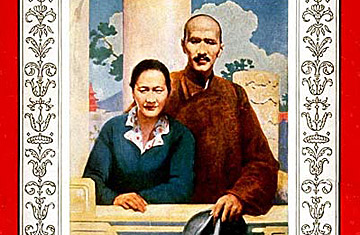
Generalissimo and Madame Chiang Kai-shek
(3 of 8)
Beyond humanity two great distinctions remain: 1) Radio's Man of the Year Charlie McCarthy, the greatest ventriloquist's dummy in 3,000 years of human history; and 2) Animal of the Year, Congo, the rare okapi (resembling a cross between an antelope and a giraffe), sent to the New York Zoological Society by the Antwerp Zoo "as a gesture of friendship and gratitude" for 325 birds & animals sent by the Society to Antwerp to restock the zoo which Kaiser Wilhelm's troops ravaged. With his 14-in. tongue, the Animal of the Year is adept at washing his long furry ears. Not in the Americas, however, not in Europe, not in Africa, not in Australia, but in Asia are to be found 1937's outstanding public characters.
In 1937 the world's most populous nation—China—was engaged on land, sea and in the air by the only non-white people who have ever shown aptitude for conquest by machine-age methods—the Japanese. Last week, in remote and neutral Stockholm the great Swedish explorer of Asia, Dr. Sven Hedin, said in a lecture before the Swedish Academy: "Recent events in China constitute not only a warning but a final signal that the white man's burden soon will be taken over by a very willing Japan. The reign of the white race in the Far East is coming to an end."
If in 1937 any Japanese had been responsible for creating the situation which Sweden's Dr. Hedin thinks has been created, then that Japanese would assuredly be Man of the Year. There is no such Man. No one Japanese leads or even controls the avalanche which Japanese ambition has in motion. Much as a hill of ants are driven by their impulses to conquer another ant hill, the Japanese have gone forth to war. No Napoleon and no Bismarck guides them. The Japanese Emperor & Elder Statesmen, the Army & Navy chiefs in Japan, the Cabinet, the Japanese Army & Navy chiefs in China, are all mutually rival groups.
But while Japan launched her great adventure without outstanding leadership, China, the victim of the adventure, has had the ablest of leadership. Through 1937 the Chinese have been led—not without glory—by one supreme leader and his remarkable wife. Under this Man & Wife the traditionally disunited Chinese people —millions of whom seldom used the word "China" in the past—have slowly been given national consciousness.
He is a salt seller's son, she a Bible salesman's daughter. No woman in the West holds so great a position as Mme Chiang Kai-shek holds in China. Her rise and that of her husband, the Generalissimo, in less than a generation to moral and material leadership of the ancient Chinese people cover a great page of history.*
